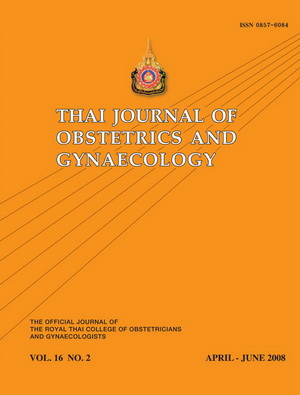Analysis of Vaginal Hysterectomy in a Residency Training Program: A 5 Years Experience at Chonburi Regional Hospital
Main Article Content
Abstract
Objective This study present the amount of vaginal hysterectomy performed by residents on
training program. The study also compares surgical complications and patient outcomes
between vaginal hysterectomy performed by staffs and those performed by resident
physicians with the staff assisting and teaching.
Study design Retrospective descriptive study.
Material and Method During a 5 years interval (January 2003 - December 2007) 107 patients who
underwent vaginal hysterectomy at Chonburi Regional Hospital. Demographic, historic and
preoperative physical examination variables were presented and compared. Intraoperative
and postoperative outcomes were also compared.
Results Patients operated by the staffs (group 1) had more old age than resident
physicians (group 2)(group 1 vs group 2 : 67.6 years vs 62 years, p=0.01). No difference
were observed for BMI (p=0.96) and hospital stay (p=0.78). The patients operated by
resident physicians required longer operating times (group 2 vs group 1:102.40 minutes vs
91.04 minutes) and more estimated blood loss (group 2 vs group 1:237.35 ml vs 170.83 ml).
But there were no a statistical difference for operating time (p=0.05) and estimated blood
loss (p=0.13). The patients were elderly women with underlying medical diseases (35.5%).
There were no serious complications in both groups.
Conclusion We demonstrated that in a regional hospital which has residency training program,
the resident physicians could be taught to perform vaginal hysterectomy with a slightly
prolonged operative time and blood loss. There were no serious complications.
training program. The study also compares surgical complications and patient outcomes
between vaginal hysterectomy performed by staffs and those performed by resident
physicians with the staff assisting and teaching.
Study design Retrospective descriptive study.
Material and Method During a 5 years interval (January 2003 - December 2007) 107 patients who
underwent vaginal hysterectomy at Chonburi Regional Hospital. Demographic, historic and
preoperative physical examination variables were presented and compared. Intraoperative
and postoperative outcomes were also compared.
Results Patients operated by the staffs (group 1) had more old age than resident
physicians (group 2)(group 1 vs group 2 : 67.6 years vs 62 years, p=0.01). No difference
were observed for BMI (p=0.96) and hospital stay (p=0.78). The patients operated by
resident physicians required longer operating times (group 2 vs group 1:102.40 minutes vs
91.04 minutes) and more estimated blood loss (group 2 vs group 1:237.35 ml vs 170.83 ml).
But there were no a statistical difference for operating time (p=0.05) and estimated blood
loss (p=0.13). The patients were elderly women with underlying medical diseases (35.5%).
There were no serious complications in both groups.
Conclusion We demonstrated that in a regional hospital which has residency training program,
the resident physicians could be taught to perform vaginal hysterectomy with a slightly
prolonged operative time and blood loss. There were no serious complications.
Article Details
How to Cite
(1)
Chotivanich, N. Analysis of Vaginal Hysterectomy in a Residency Training Program: A 5 Years Experience at Chonburi Regional Hospital. Thai J Obstet Gynaecol 2017, 16, 129-132.
Section
Original Article


